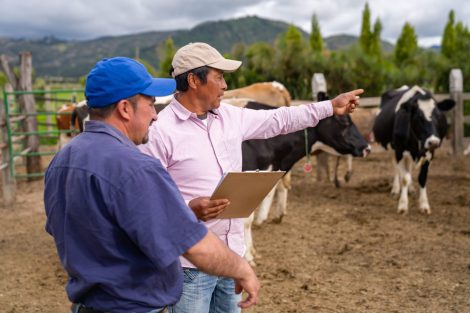
The Quadripartite organisations – the Food and Agriculture Organization of the United Nations (FAO), the United Nations Environment Programme (UNEP), the World Health Organization (WHO) and the World Organisation for Animal Health (WOAH) – warmly welcomed the adoption of the Jeddah Commitments issued at the 4th Global High-Level Ministerial Conference on Antimicrobial Resistance (AMR). The conference was hosted by the Kingdom of Saudi Arabia at the Red Sea port city of Jeddah on 14-16 November.
The conference was attended by ministerial delegations from all regions, representing agriculture, food, environment, human and animal health sectors, as well as global, regional and country-level stakeholders, envoys, researchers, health workers, environment professionals, youth advocates and survivors of AMR.
The Jeddah Commitments are the collective declaration to open a new chapter in global efforts to address AMR, building the coalition of the willing into a powerful force for impact to turn the tide of AMR. The document provides clarity on specific mechanisms and agreements to translate the historic political declaration approved just over a month ago at the UN General Assembly High-Level Meeting on AMR into real-world action.
The Jeddah Commitments reiterated priority actions from the 79th UNGA High-Level Meeting political declaration on AMR, including:
In addition, the Jeddah Commitments included new initiatives such as:
The Jeddah Commitments underscore the need for a globally coordinated effort to combat AMR, one that addresses human, animal, plant, and environmental health in a unified framework. With the Quadripartite’s collaborative initiatives, Member States have vital tools to help translate this vision into measurable action.
The Quadripartite applauds the Jeddah Commitments’ recognition of the standards of Codex Alimentarius Commission and their implementation, the International FAO AMR Monitoring (InFARM) system, WHO’s Global Antimicrobial Resistance and Use Surveillance System (GLASS), WOAH’s global database on antimicrobial use in animals (ANIMUSE), and other critical programs driving global AMR progress.
The conference closed with the announcement that the Government of Nigeria is confirmed as the host of the 2026 summit. The conference’s successful conclusion set the scene for the annual World AMR Awareness Week 2024 campaign. The Quadripartite will work to amplify the momentum during the campaign, running from 18 to 24 November, being marked this year under the theme, “Educate. Advocate. Act now.”
The Quadripartite encourages policymakers, scientists, industry leaders, and communities worldwide to join the movement against AMR. With the UNGA political declaration on AMR and the Jeddah Commitments serving as a guiding framework, the Quadripartite stands ready to continue to support Member States in taking tangible steps to protect health and sustain ecosystems for future generations.
For more on the Quadripartite’s AMR initiatives and ways to participate in WAAW 2024, visit Quadripartite Joint Secretariat on Antimicrobial Resistance.
About the Food and Agriculture Organization of the United Nations (FAO)
FAO is a specialized agency of the United Nations that leads international efforts to defeat hunger. Its goal is to achieve food security for all and make sure that people have regular access to enough high-quality food to lead active, healthy lives. With 195 members – 194 countries and the European Union, FAO works in over 130 countries worldwide.
About the UN Environment Programme (UNEP)
UNEP is the leading global voice on the environment. It provides leadership and encourages partnership in caring for the environment by inspiring, informing and enabling nations and peoples to improve their quality of life without compromising that of future generations. For more information, please contact: [email protected], News and Media Unit, UN Environment Programme https://www.unep.org/
About the World Health Organization (WHO)
Dedicated to the well-being of all people and guided by science, the World Health Organization leads and champions global efforts to give everyone, everywhere an equal chance at a safe and healthy life. We are the UN agency for health that connects nations, partners and people on the front lines in 150+ locations – leading the world’s response to health emergencies, preventing disease, addressing the root causes of health issues and expanding access to medicines and health care. Our mission is to promote health, keep the world safe and serve the vulnerable. www.who.int.
In addition, WHO hosts the Quadripartite Joint Secretariat on AMR (QJS) with dedicated liaison officers and responsible officers from FAO, UNEP, WHO and WOAH. The QJS manages the day-to-day operations of the joint work of the Quadripartite organizations on AMR. https://www.qjsamr.org/
About the World Organisation for Animal Health
WOAH is a global organisation, working to ensure the health of animals across the world. Since 1924, we have focused on the complexities of animal health. We disseminate information on animal diseases and use science-based strategies to limit their potentially negative impact on society.

